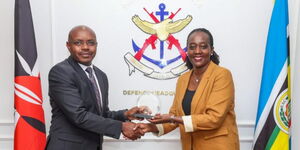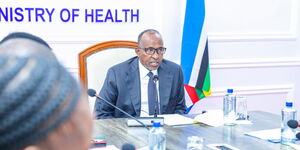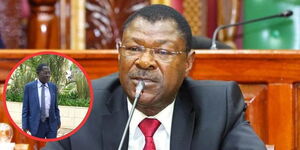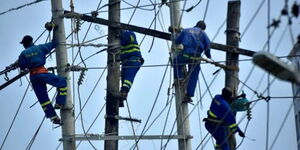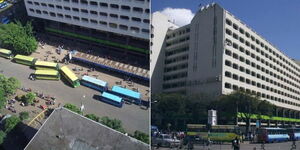In 2023, the political landscape has been marked by a series of dramatic events, ranging from nationwide protests to multiple impeachment attempts.
Politicians have gone about their duties loudly, looking to position themselves strategically ahead of the 2027 elections.
Kenyans.co.ke has compiled a snapshot of pivotal political occurrences that captured widespread attention, with some of them garnering attention from the international community.
Maandamano
Azimio leader Raila Odinga rallied his supporters for national anti-government protests on March 20, aptly named 'Maandamano Monday.'
The demonstrations aimed to address pressing national concerns, including the high cost of living, the reconstitution of the Independent Electoral and Boundaries Commission (IEBC), the auditing of the 2022 election results, and the marginalisation of specific regions in the appointment of state officials.
Regrettably, the peaceful intent of the protests was marred by incidents of violence, as some supporters deviated into looting sprees and attacks on private property.
Efforts by law enforcement to prevent Raila from entering the Central Business District (CBD) faced criticism for the perceived use of excessive force, leading to a few reported casualties.
In response to the escalating situation, Raila made the decision to call off the protests, having twice skipped scheduled demonstrations.
Subsequently, the government and the opposition opted for a more diplomatic approach, engaging in bi-partisan talks to address and resolve the underlying issues.
Bi-Partisan Talks
The bi-partisan talk began after President William Ruto extended an invitation to Raila Odinga to discuss issues raised during Maandamano through a bipartisan approach.
While the President wanted the discussions to be held in Parliament, Raila wanted the talks to be done outside the House, claiming that UDA had compromised most MPs by outrightly bribing them.
The two parties agreed to form the National Dialogue Committee(NADCO) co-chaired by Wiper Leader Kalonzo Musyoka and Majority Leader Kimani Ichung’wah.
After a series of meetings and one or two deadlocks, NADCO presented its report to President Ruto and Odinga, who both agreed to recommend the adoption of the report.
However, a section of leaders from Azimio, including Martha Karua, opposed some of the proposals and claimed that the committee did not address the most pressing issue— the cost of living.
Kawira Impeachment
Meru County Governor Kawira Mwangaza was the first county boss to face impeachment in 2023, following a failed attempt in 2022.
The county chief, who ran on an independent ticket, found herself on the MCAs’ chopping board in what was the culmination of protracted wrangles between her and them.
During her first impeachment, the grounds given included nepotism, abuse of office, and gross misconduct. The main cause of the strife was because she allegedly refused to release development funds to MCAs.
She was, however, saved by the Senate, and soon after, Deputy President Rigathi Gachagua stepped in to try and mediate the conflict between the two warring sides.
Barely three months after, a second motion to impeach her was filed at the County Assembly, where 80 per cent of the house voted to send her packing.
The motion was escalated to the Senate, where Kawira pleaded not guilty to all charges.
She claimed she was a victim of bitter election rivals trying to oust her. The Senate blocked her impeachment for the second time.
ODM Defections
2023 saw a mass exodus of several Members of Parliament elected on an ODM ticket pledge loyalty to President William Ruto.
In what was arguably the betrayal of the year, a group of MPs from Raila’s Nyanza backyard publicly declared that they would work with the UDA government.
Among them were Lang’ata MP Phelix ‘Jalang’o’ Odiwuor, Kisumu Senator Tom Ojienda, and Gem MP Elisha Odhiambo.
Dubbed traitors, they were barred from attending ODM Parliamentary Group meetings, with the party members demanding they relinquish their seats and seek a fresh mandate from the electorate.
The defectors were summoned by the disciplinary committee, which told them to resign.
They took the matter to the political parties' tribunal, which ruled in their favour.
Cabinet Reshuffle
President William Ruto made his inaugural cabinet reshuffle in October. The shake-up affected Cabinet Secretaries in critical ministries.
Prime Cabinet Secretary Musalia Mudavadi was handed extra duties and was named the new Foreign Affairs Cabinet Secretary.
Alfred Mutua, who was at the time the CS for Foreign Affairs, was moved to Tourism, initially held by Peninah Malonza who was reassigned to the EAC & ASAL Areas docket.
CS Moses Kuria was ejected from the Trade Ministry and moved to Public Service.
His position was handed to Rebecca Miano. Kuria’s predecessor, Aisha Jumwa, was handed the less influential Gender Ministry.
Kuria claimed that his removal from the Trade docket was lobbied for by Deputy President Rigathi Gachagua, with whom he had been at loggerheads.
Additionally, CS Alice Wahome was posted to the Ministry of Lands while her Water docket was taken over by CS Zachariah Njeru.

